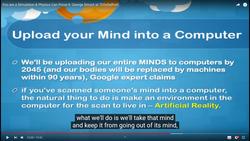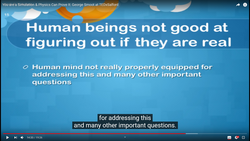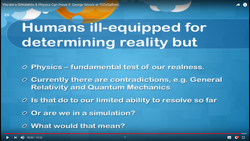Þú ert sýndarmynd og eðlisfræðin getur sannað það. (Allt bendir til að það sé rétt. Jg)
You are a Simulation & Physics Can Prove It:
George Smoot at TEDxSalford
https://www.youtube.com/watch?v=Chfoo9NBEow
Við vitum allir, að efni er ekki til, efni er aðeins orkumynd, sýndarveruleiki. jg
Klikka mynd, þá stærri

Hlaða hugann inn í tölvu. (Hvað skildi það vera sem hér er kallað hugur? Jg)

Við skiljum ekki hvort við erum raunveruleg. (Hvað er að vera raunverulegur? Jg)

Við erum illa til þess fallin að skilja raunveruleikann – erum við sýndarveruleiki? – (Hvernig á að skilja það? jg)

Mynd af heilanum tekin á tíma, 45 mínútur af tengingum í mannsheila.
Textauppskrift
00:00
Translator: Robert Tucker Reviewer: Helena Bedalli
00:16
Thank you, it's a pleasure to be here.
00:18
They asked me if I wanted a drink before I came on
00:20
and I asked for a pint but they gave me water.
00:23
(Laughter)
00:24
So, following the other speakers I have a change of pace,
00:27
a little bit of a fun talk.
00:29
And what I am going try and do is convince you you're a stimulation,
00:32
and that physics can prove it, okay?
00:35
(Laughter)
00:36
So, instead of a usual uplifting talk, this is a different kind of talk.
00:39
Okay, so, there's one thing you know for certain,
00:43
that is that you exist as a flesh and blood human being;
00:46
my goal is to convince you otherwise. Okay?
00:50
So, logic is not going to be enough,
00:52
you guys are going to be simulation deniers,
00:56
there's just no way round it.
00:58
So, my actual goal will be to actually create a sliver of doubt in your minds,
01:01
so that you actually think about this, and what it might mean. Okay?
01:06
So, here's is the first check about simulations.
01:09
How many of you have ever played a computer game?
01:11
Just raise your hands.
01:13
Ah, alright.
01:14
So, did you do it against simulated player or simulated players?
01:18
Or, in fact, was it you, several people plus simulated people?
01:23
Right. And what role did you take? Was it a pawn or a hero?
01:27
What role do you have in life? Is it pawn or hero?
01:30
Right. Are you the king, for example?
01:33
(Laughter)
01:34
I don't see him here... but...
01:38
Now, the other thing you might ask, if you were a social scientist,
01:41
or other kind of scientist like a cosmologist:
01:43
Would you like to run realistic simulations
01:45
to test and develop your theories? Likewise for political candidates.
01:48
Right? So, I'm just trying to see there's motivation for it.
01:52
And then the question is: Are computation and simulation capabilities
01:57
increasing over time?
01:59
So, think of the HetNOS, think about Moore's law,
02:02
think about what computer you had when you were young
02:04
and what you have on you now, not that you're not all young still.
02:07
Okay, that's just setting you up for having the doubt.
02:10
Okay, so we'll take a little journey into philosophy.
02:14
Solipsism is the idea that one's own mind is the only thing that's sure to exist.
02:19
It turns out, people have been studying this for decades,
02:22
and realizes both irrefutable and indefensible at the same time,
02:27
so have this point of view,
02:29
and that it's not a falsifiable hypothesis,
02:32
there are people who work on this issue.
02:34
So, there doesn't seem to be any imaginable disproof that you can have,
02:38
so even if you have a Solipsan, he dies,
02:40
you can't falsify his belief, because he's not there to do it.
02:44
This is a pragmatic dead end, it's kind of like what we have on TV now,
02:47
which is, you know, zombie philosophy.
02:52
But there is an opposite, that is philosophical zombies.
02:57
There's a slight use to philosophical zombies.
02:59
So what is the idea here?
03:02
The philosophical zombie is a hypothetical being
03:04
that in this thing what you all thought a normal human being,
03:07
that is everybody you think you are, you know what you think you are,
03:10
except that it lacks conscious experience, qualia or sentience.
03:14
So, if you take a philosophical zombie and poke it with a sharp object,
03:18
it doesn't feel any pain, however, it behaves exactly as if it does.
03:22
It would say "ouch" and do all the usual kind of things.
03:26
So, what the zombie is there for, is to support the idea
03:30
that the world includes two kinds of things: the mental and the physical,
03:34
or the concepts and the physical world around you.
03:38
And so that's the idea.
03:40
So, we have in cosmology, lots of things. We have the anthropic principal,
03:44
that is, a philosophical concept that the universe must be compatible
03:47
with conscious life that observes it.
03:49
And there's a strong version and a weak version.
03:51
One of them that says the universe is compelled to have conscious life emerge,
03:55
and the other says that the universe is fine-tuned for life to be necessary.
04:00
And this is pretty much in line with a lot of even more specific kind of ideas,
04:05
from conservative Christianity and Islam, that there's intelligent design,
04:11
or that there could be like a simulation. I'm working on you... so....
04:16
And we also have the idea of multiverses,
04:19
that there are many different kinds... there's a metauniverse
04:21
and there's many possible universes inside of it.
04:24
And there are different reasons for that, quantum mechanics,
04:27
but also a way to explain whether physical constants happen to be the ones
04:30
that make this auditorium possible.
04:33
And so, you know, one way is to have that many real universes,
04:38
the other way is just to make a lot of simulations.
04:40
So, your choice. Okay, so now we move on.
04:43
Here's the crux of the arguments,
04:45
and these arguments have been around for more than 30 years,
04:49
they were first published 30 years ago,
04:52
and what people went to a lot of trouble to show,
04:55
that one of these three things is extremely likely to be true.
04:58
So, you get your choice between No. 1, No. 2 and No. 3,
05:01
just like the doors, look what's behind each door.
05:04
The first one is: Human civilization is unlikely
05:07
to reach a level of technological maturity
05:09
capable of producing simulated realities, or it's physically impossible.
05:13
Okay, so we made some progress in 30 years and I'll mention that.
05:17
The second is: Comparable civilizations throughout the universe
05:21
which do reach that capability
05:24
will choose not to make simulations
05:27
in such a large scale that, in fact, the probability of being a simulated being
05:32
is much higher than probability of being a real being.
05:34
So, those are your choices, right --
05:39
there's some other choices, but they're extraordinarily unlikely,
05:41
and we can pretty much rule them out.
05:44
And the 3rd choice is: Any entities with our general set of experiences
05:47
are almost certainly to be living in a simulation.
05:50
That would be us. Right? Okay? In case you guys aren't paying attention.
05:54
(Chuckles)
05:56
Okay. So, let's talk about making simulator realities by humans.
06:00
So, will humans produce realistic simulations?
06:03
And the answer is yes.
06:05
I have to keep coming back because I just wrote this talk
06:07
and so I don't remember what I have to say.
06:10
And, so, the answer to that is clearly yes, you guys already proved it,
06:15
because there's a lot of money to be made in making computer games,
06:18
simulated realities.
06:20
And the better the simulator reality, the more people you get involved in it.
06:23
There's a lot of entertainment, we have a lot of animated movies.
06:26
Now, we're going to have animated interactive movies
06:29
and videos and pornography.
06:32
So, you know, you can't rule out pornography,
06:34
in the early days of the Internet, pornography was the No. 1 commerce,
06:39
it was roughly half the commerce in the Internet in the early days.
06:42
And even today, 50% of the bits that are transmitted on the Internet
06:46
are transmitted for porn.
06:49
So, you can wonder: Why is it? Well, originally stories
06:51
and then there got to be pictures, and then there got to be videos,
06:54
pretty soon there'll be interactive videos.
06:56
So, it's clear there is a tremendous financial motivation,
06:59
and especially here in Media City,
07:01
where people make their living out of these kind of things.
07:03
So, how... I'm not sure which of the three, But OK.
07:09
How detailed and how accurate will the simulations be?
07:12
And the answer turns out, as we know from experience,
07:15
computation power is the first issue,
07:17
you have to have tremendously good computation power
07:19
to make a really good quality simulation,
07:22
and good programming, that is good software,
07:24
to explain what's going on, that's the second.
07:26
But, clearly we're making progress, just look at the games, look at PONG,
07:31
and look at that the kind of video games we have now. So, we'll see.
07:36
What about simulations by other civilizations?
07:39
So, now we know a lot more about this than we did 30 years ago.
07:42
We've made tremendous progress.
07:44
We've discovered more than 2,000 other stars
07:47
that have planetary systems around them.
07:49
And we know there is at least on the order of a billion or more habitable planets
07:54
in our galaxy, and there's about a 100 billion galaxies
07:57
for around 10^20 to 10^22 depending what your range
08:01
possible sites for life and then advanced civilizations in the universe.
08:06
So, what are the chances that the earth is the most advanced,
08:10
the most computationally powerful.
08:12
Well, the odds, you got to be really, pretty much thinking you're special,
08:17
to think that the odds are that we're the top.
08:25
So, the question is: Will advanced beings run simulations?
08:32
And, in fact, will simulated beings run simulations?
08:35
If we're simulated, are we running simulations in our simulations,
08:38
simulations all the way down? If you know the things.
08:42
So, even the people running our simulation don't know if they're a simulation or not.
08:50
It's interesting, because it creates ethics and a bunch of things
08:54
because there might be somebody watching you.
08:57
So, are ethical considerations likely to stop every single civilization
09:01
from running simulations and running large numbers of simulations?
09:05
Well, the answer I think is "no".
09:08
What if doing simulations is likely to say what we think are real lives?
09:11
Right? We're willing to do the simulations
09:13
even though they're being strapped in that simulation, right?
09:16
Conscious beings.
09:17
And the other thing you might consider is how do human beings
09:20
treat what they think are real human beings.
09:23
How's the ethical treatment on our Earth?
09:26
And how much more is society likely to advance
09:28
before we're doing
09:31
very advanced simulations of civilizations and beings?
09:36
So, we'll probably all be in a simulation. The lights are not on enough in here,
09:40
but look to the left and look to the right,
09:42
if there's anybody here you think is a real person, this is a random sample,
09:46
then you're probably not. (Laughter)
09:50
But, you know, If you think you're a social scientist
09:53
or an anthropologist or something, and you want to run
09:56
and see how the civilizations rise and fall,
09:58
you'll run simulations with up to billions of people.
10:02
And you will run many of those simulations,
10:04
so it's not so hard to imagine you'll get up to the level
10:07
of 10^12:1 simulated beings to unsimulated beings,
10:12
that's why the probability becomes fairly likely
10:14
that any being that has a behavior or activities and experiences like us
10:19
is simulated.
10:22
Sorry, I got some sunscreen in my eye.
10:26
Put on sunscreen this morning in case it was an unusual day in England.
10:29
(Laughter)
10:32
And I got a little in my eye here.
10:34
So let's talk about how we're going to do the simulations on the Earth.
10:39
This is part of going back to convince you
10:42
that we're going to have realistic simulations
10:43
and we're going to have artificial reality to go with it.
10:47
So, can we take a real brain and make it into a virtual mind?
10:50
And the answer is: So, here is the purple real brain,
10:54
and the neurons behind it, it's this neural net,
10:57
it's the regional neural net, as far as we're concerned.
11:00
And then on the left, yeah your left,
11:03
there is the beginnings of a mapping of a brain,
11:07
so that I can take and map that brain, and just place it into a computer.
11:11
So, how's that going to work?
11:12
The answer is, it's going to work just fine,
11:15
because we're there to the point where we can do it now.
11:18
So, here is a high-resolution, 45-minute brain scan
11:22
that was done in February.
11:24
And 45 minutes, that's how long you have to hold the person's head still,
11:28
in order to make a map to this level.
11:31
And what you can see here are the main --
11:33
Let's see if the laser pointer works -- -- No --
11:35
So, you can see here the main highways in your brain.
11:39
They're mapped out by this, and this is basically an MRI
11:43
I got a scan of my brain done and I was really impressed,
11:46
to prove that I had a brain, but one of my friends got an fMRI
11:49
to prove that his brain worked. (Laughter)
11:53
The thing that's impressive about this
11:56
is that the MRI's are getting so good now,
12:00
you can map to the individual neuron level.
12:03
The problem is there's a lot of neurons,
12:05
so you have to hold the head still for a long time,
12:07
and that's an advance in the ability to do the mapping,
12:10
and also in the software for doing that mapping.
12:13
And, so, that's where we are today.
12:15
If we can hold the person still long enough, if we can find a volunteer
12:18
that we can put, you know,
12:20
the little plastic thing on their head, to hold their head still for some days,
12:24
which is a little bit of a problem, we could probably go ahead
12:27
and map their entire brain,
12:30
and then just transform that map into a computer model,
12:33
and we would have that person's mind downloaded into a computer.
12:37
This is coming and this is coming soon,
12:40
just like it's now possible for the order of ÂŁ1,000 to get your DNA mapped,
12:47
it's going to cost you something,
12:49
in about 30 years it's going to be possible
12:52
to download your brain into a computer for about ÂŁ1,000 pounds,
12:56
plus inflation. (Laughter)
13:00
Could go up, could go down. Right?
13:02
But there's tremendous advances in technology
13:05
and these are making it possible to do things that before we were without.
13:08
So, I have quote from a Google expert,
13:10
we'll be uploading entire minds to computers in 2045.
13:13
He also says we'll do bodies too, I'm thinking we won't do bodies,
13:17
what we'll do is we'll take that mind and keep it from going out of its mind,
13:22
we'll put it on artificial reality,
13:23
it's in the computer, it's going to get bored,
13:25
wants entertainment, wants social interactions,
13:28
so we're going to create artificial realities.
13:30
Now, in the old days, we'd make a thing like that,
13:32
if you remember the matrix. Right?
13:34
Ones and zeros, now, in fact, we may use quantum computers,
13:37
so we'll have entangled states,
13:39
but, in fact, it'll be some kind of a complicated environment
13:41
where we can interact socially, because people want to be social,
13:45
so there'll have to be thousands of people to interact with,
13:47
and there'll have to be all kinds of other things
13:50
in order to make that artificial environment
13:52
sort of realistic and keep you going.
13:54
And remember, when you download your brain,
13:56
you're going to think about a million times faster,
13:59
you're going to experience life about a million times faster.
14:01
It's going to be a very different kind of a situation.
14:04
You know? The idea of going back and machines
14:05
and go out in the real world where things are still slow slow,
14:08
you're going to get tired of doing that.
14:11
And the size of simulated porn isn't so good in the real world.
14:16
Okay, so, now, the other thing I have to do
14:19
is to attack your certainty.
14:23
So, I have to point out to you, human beings are not good at figuring out
14:27
if they're real.
14:29
So, your mind is really not equipped
14:31
for addressing this and many other important questions.
14:34
So, the first question I'm going to give you
14:36
is count the number black dots.
14:38
(Laughter)
14:40
It's a still picture and there's no video.
14:50
Here we go. You see this picture?
14:53
How many of you see the horse in the picture?
14:56
How many of you cannot see the horse in the picture?
14:59
Once you see the horse, it's hard not to see the horse.
15:02
And I want to show a picture of an object and ask you: Can it be real?
15:07
And then I'm going to tell you, it's a photograph,
15:09
the watch is real, the paper's real, the desk is real,
15:13
Is that object real?
15:15
Well, it's a photograph, so it's a real in some sense,
15:18
as is this, and for me, this object flips back and forth.
15:25
Here's the real version of that, made out of 2x4s, focused at different angles,
15:34
and you see it's an optical illusion where your eye puts it together.
15:38
And here's another example, and this is another example, just for fun,
15:44
because you know it's just rotated,
15:46
but the first response is: Phew, that's weird.
15:48
So, here's one you're going to get the answer to.
15:50
Which of these is longer?
15:54
So, they're the same. How come? It doesn't really look that way to you.
15:58
You knew that I was tricking you, so you understand,
16:02
well, you still look at it, and think, well, but I'd better check now.
16:05
because I know I'm going to make mistakes.
16:07
Okay, so one more.
16:10
I'll skip the lilac chaser on the other side,
16:13
and just ask you about the stuff on the right.
16:15
Are those lines straight or not?
16:18
Well,they are straight, but to your eyes,
16:20
it's really hard to convince you they're straight.
16:23
Your brain is set to do other things.
16:27
Here's another Bayesian reading test --
16:30
in the land of Bayes that we do it.
16:32
There's many examples you can give this, but a cab was involved in a hit-and-run,
16:36
and two cab companies are in the town,
16:39
green cabs and blue cabs.
16:41
And they operate: 85% of the cabs are green, 15% are blue.
16:46
The witness says the cab was blue.
16:48
When he's tested, he gets it right 80% of the time,
16:50
or she gets it right 80 % of the time.
16:53
What's the probability that it really was a blue cab?
16:55
You have to go through the calculation carefully,
16:58
this is the only equation, usually when I put equations up people go -- but --
17:03
it's almost 60% chance that the cab was green,
17:07
even though this person gets it 80% right.
17:09
And this is relevant, but there are other kinds of test like that.
17:12
So, you can have tests that are even more powerful,
17:14
like the test for breast cancer is 99% correct;
17:17
it gets the wrong answer 1% of the time.
17:19
But roughly a thousand times as many people,
17:22
who... you know, 1,000 of the people that get tested actually have breast cancer,
17:25
so, when you get the first response that you have breast cancer,
17:29
itćs only a 10% that chance you really do, it's not to you get the next test.
17:33
But the10%, you know, the 10 people are freaked out.
17:36
Humans aren't ready for dealing with that kind of thing.
17:40
Okay, so, it's because we lack computing power.
17:43
So, we have compromises in our algorithms, right?
17:46
Humans, therefore, are susceptible to optical illusions,
17:51
systematic errors in judgment -- I'm running out of time --
17:53
I should have gone faster -- I got confident --
17:55
difficulty with complex decisions -- and keeping on time --
17:59
and the ability to function in a prehistoric world,
18:02
which was the important one, you know.
18:03
Only a few percent of the humans got wiped out,
18:06
before they were able to reproduce, okay?
18:08
So, simulations are going to make the same kind or similar approximates.
18:11
So, we have many contradictions.
18:14
We could see if our physics is inconsistent,
18:18
then it's likely we're in a simulation, if physics is self-consistent
18:21
it's more likely we're real, because it just takes more to do that.
18:24
So, then one of the implications is, if we're in a simulated environment
18:29
what we're going to do? Well, we're going to be discretized,
18:32
that is fuzzy on a small scale, we're going to have entangled states,
18:35
it means quantum mechanics. We have the holographic principle,
18:38
that everything inside every environment is enclosed on the surface.
18:41
So, here's an example.
18:43
The hand and the apple
18:45
are encoded on a geometrical sheet but projected into three dimensions,
18:48
that's a way to keep track of everything,
18:50
and the large scale in space and time may not match the small scale.
18:55
So, let me finish up.
18:57
Human beings are ill-equipped for determining reality.
19:00
Physics, so this is actually a selling thing for physics,
19:03
is a fundamental test of our realness. Currently we have contradictions.
19:07
Is that because we're not good at resolving things,
19:10
or is it because we're in a simulation? And what would that mean?
19:14
Thank you.
19:16
(Applause)
Egilsstaðir, 16.07.2019 Jónas Gunnlaugsson














